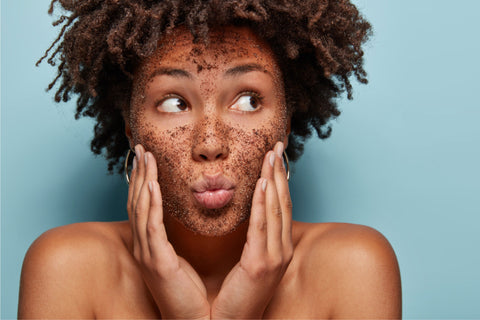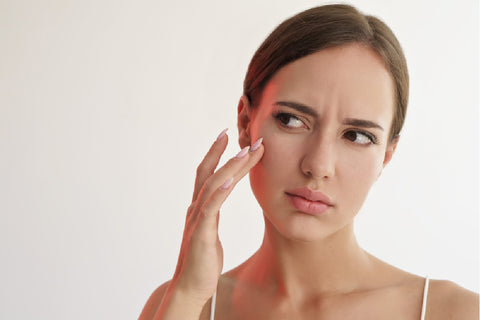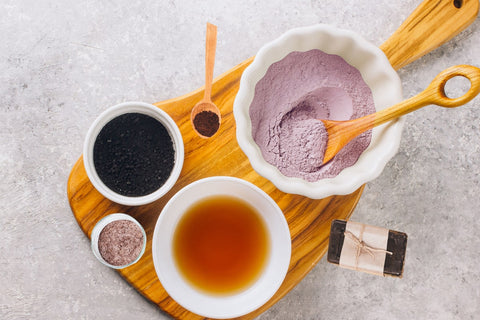Try utilizing rose clay and charcoal soap, which is not synthetic or chemical-based but rather handcrafted, if you are wary of your skin's dull and uneven complexity. With the help of this amazing homemade rose clay and charcoal soap recipe, you may detoxify and revitalize your dry, dull skin.

With their powerful advantages of essential oils, rose clay and charcoal effectively draw impurities and toxins to the skin's surface where they can be washed away, leaving the skin clean and soothed. In this post, we'll go through the incredible benefits of rose clay and charcoal soap, along with a straightforward recipe you can make for yourself.
Rose Clay Benefits For Soap Making
The anti-microbial, detoxifying, and high antioxidant content of rose clay soap is well known. In addition, it has incredible anti-aging and skincare benefits for treating acne and pimples. Let's look at a few advantages rose clay has for creating soap.
1. Skin Detoxification
Regular or daily use of a rose clay face wash will benefit those with oily skin. All toxins and impurities are gently removed with rose clay soap without removing the natural oil.

To combat the detrimental effects of these contaminants under your skin, use rose clay while producing soap. Regular use is secure. However, if you have sensitive or dry skin, use a scrub as a thorough weekly cleanser.
2. Absorb And Remove Impurities
The enormous surface area within the powdered rose clay gives it its absorbing power. The rose clay soap penetrates the skin with a face wash or facial scrub and specifically works its magic in your pores.
Rose clay soaps come in very handy since they not only clean the pores but also help to relax them, which helps to increase the skin's capacity to contain oxygen, making the skin look younger and tighter.
3. Antibacterial Properties
Rose clay not only provides smooth skin, but it's full of antibacterial properties? This is one of the reasons it can keep acne-prone skin looking its best.

By battling adverse reactions to bacteria and oils in the skin's pores, a rose clay face cleanser can treat current acne and stop new acne from developing.
4. Boost General Skin Health
Rose clay eliminates harmful pollutants while reducing inflammation, removing dead skin cells, tightening pores, and fading hyperpigmentation.
This soap contains rose clay, which gives it a lovely pink tint and wonderful skincare properties. It is a wonderful clay to use on sensitive and aging skin because it is very mild and delicate.
5. Incredible Exfoliator
This soap is mild and hydrating on your skin, thanks to the abundant avocado oil. Great for the body and face.

Rose clay soap works as an exfoliator for the skin since it soothes irritation, improves circulation, regenerates collagen, encourages the creation of new skin cells, and regenerates elastin.
Charcoal Benefits For Soap Making
Charcoal is becoming increasingly popular every day, and for a good reason—it can scrub your face of all pollutants and leave it looking fresh and clean. Since charcoal has so many advantages, finding its uses in soap manufacturing is very simple. Let's look at some of them.
1. Removes Impurities
If you often use various skincare or makeup products, some microparticles may eventually clog your pores, resulting in imperfections like pimples, blackheads, or general dirt accumulation.

The crucial component to use when you want a deeper cleanse that gets rid of deeper impurities from your skin is activated charcoal. The activated charcoal soap removes your face's pollutants.
2. Cleanse Excess Oil
Oily skin types frequently gush about how much they adore activated charcoal soap for its amazing capacity to absorb extra oil.
Regular face wash may remove excess oil from the skin's surface, but activated charcoal soap penetrates deeply into pores to absorb it, keeping the skin from becoming irritated or dry.
3. Decrease Blackheads
As you may imagine, fewer blackheads mean pores that are cleaner. Blackheads are clogged pores or tiny hair follicles that have accumulated debris, products, or sebum, the natural oil that our bodies create.

Blackhead-causing accumulation is deep cleaned with the use of activated charcoal soap. However, while many charcoal soaps assist in removing such buildup, charcoal also functions as a prophylactic agent to stop the development of blackheads before they worsen.
4. Soothe Acne-Prone Skin
Some soaps with activated charcoal even aid in acne relief. However, it may not seem easy when looking for a remedy or alleviation. Acne is sometimes difficult to manage.
Inflammation of the pores, known as acne, is frequently brought on by an accumulation of bacteria, dead skin cells, or irritants. Keep your face clean and free of any extra bacteria that could bring in an outbreak of acne.
5. Skin Exfoliation
Activated charcoal aids in a more thorough washing when exfoliating the face.

A mild activated charcoal scrub may remove the deepest filth from pores while absorbing the tiny molecules most other exfoliating scrubs leave behind instead of stripping the top layer of the skin with harsh chemicals or textures.
Rose Clay And Charcoal Soap Ingredient
It is best to have all the ingredients and supplies ready before beginning the rose clay and charcoal soap-making recipe because doing so will reduce stress while working and make your work easier.
- Aloe Vera Melt And Pour Soap Base - 225 Grams
- Shea Butter Melt And Pour Soap Base With Glycerin - 450 Grams
- Activated Charcoal - 2 Teaspoons
- Rose Clay Powder - 2 Teaspoons
- Ylang Ylang Essential Oil - 10-20 Drops
- Vanilla Essential Oil - 10-20 Drops
- Sandalwood Essential Oil - 10-20 Drops
- Virgin Coconut Oil - 1 Teaspoon
- Dried Rose Petals - 1 Tablespoon

In addition to all the ingredients, you required some standard supplies.
1. Soap Pouring Containers
2. Knife
3. Digital Thermometer
4. Circular Soap Mold
5. Spoon
6. Spray Bottle With Rubbing Alcohol
DIY Charcoal And Rose Clay Soap Recipe - Step By Step
You can make your DIY charcoal and rose clay soap at home by following this recipe, one of the easiest things you can attempt right now.

- Start by chopping your soap bases into 1-2 inch cubes, being careful to keep the shea butter base and clear base separate; if present in liquid form, it is even better. After cutting, put the shea butter base in one microwaveable container and the clear soap base in another.
- Microwave for 30 seconds at a time, starting with the clear base until everything is melted. To make sure everything is melted and smooth, stir with a spoon. Two teaspoons of activated charcoal should be added to the container; whisk to combine thoroughly.
- The amounts of Ylang Ylang, Vanilla, and Sandalwood essential oils to be added range from 10 to 20 drops each. The aroma of the soap will get stronger the more you apply. Mix well.
- Your activated charcoal soap mixture should fill the bottom third of your circular soap molds. Six molds should be able to be filled to the third level. It would be best if you now microwaved your shea butter soap for intervals of 30 seconds. Assemble everything and whisk thoroughly.

- Rose clay, two teaspoons, is added. This tends to clump together and combine as thoroughly as possible, flattening any clumps against the container's walls. The clay will gradually and evenly mix with the soap base.
- Stir in one teaspoon of fractionated coconut oil. Ten to twenty more drops of Ylang Ylang, Vanilla, and Sandalwood essential oils should be added. Remix thoroughly.
- Before continuing, wait until this combination has heated up to around 50–55 degrees C. This indicates that the soap base has a very thin layer of skin on top, and the container will feel warm to the touch but not hot.
- Once it reaches this temperature, use a spray bottle filled with 90% rubbing alcohol to mist the charcoal layer of soap in the molds. The layers might then adhere as a result. Fill all six molds with the rose clay mixture, which you should now pour over the charcoal layer.
- Use the alcohol spray bottle to get rid of any bubbles that may be on the top. Top up each mold with a few rose petals. Remove soap from molds after it has fully dried, then use.
Conclusion
Choosing the right ingredient improves the quality of your homemade soap tenfold, where to get the best ingredients. Fret not. Visit us at VedaOils.com and get amazing discounts on your purchase. So come and join us at VedaOils.
In recent years, rose clay-activated charcoal has become a hugely popular ingredient in soap-making. Due to its amazing skincare benefits, many people have had positive outcomes with rose clay and charcoal soap, enjoying clearer skin and a healthier complexion.












 Sign in
Sign in Register now
Register now My Reward Points
My Reward Points









